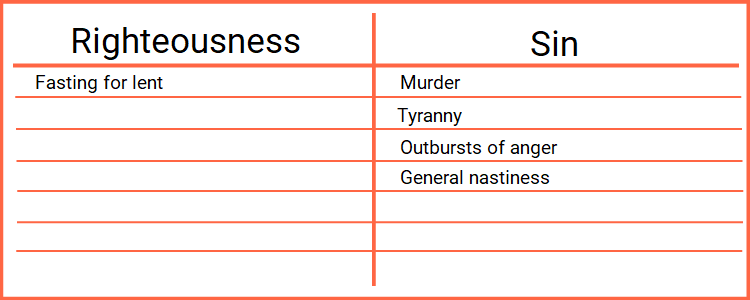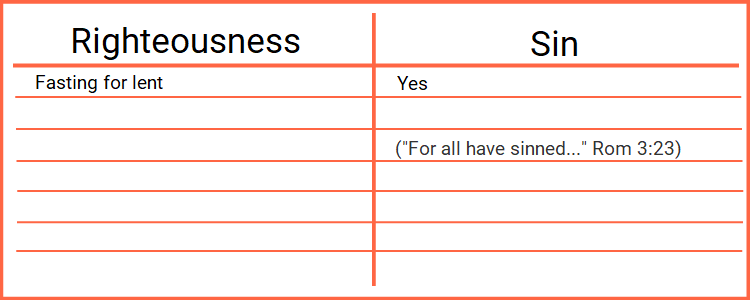Tsar Ivan the Terrible was known for his paranoia and terrible fits of rage. Anyone who angered Ivan the Terrible to the slightest degree faced instant execution. He was constantly throwing violent tantrums, and during one outburst, Ivan even beat his own son and heir to death. Standing up to the tsar in those times was an unthinkable act, but one day a so called “Fool for Christ” named Basil did just that. It was spring in Russia, a time when followers of Russian Orthodoxy fast for Lent. Basil approached Ivan the Terrible and offered him a slab of raw meat, insisting that there was no point in fasting, since the tsar had committed too many murders to be able to cover his sin with the act of fasting. Ivan realized that Basil was right, and deeply respected him for standing up to him. In fact, when Basil died, Ivan the Terrible himself acted as a pallbearer at the funeral and named the most famous cathedral in Russia after him.
I believe that Basil Fool for Christ had some theological problems, but one thing that I certainly agree with him on is that the act of fasting is not enough to cover the sin of murder. Murder is such a serious sin and fasting is so insignificant that trying to become justified through fasting is simply too little, too late. But aren’t all sins serious? Aren’t all good deeds so minute compared to Christ’s perfect life? I wonder if Basil ever pondered just how much sin someone can cover up by fasting. Or, for that matter, I wonder if he ever considered just how many good works one would have to do to cover the sin of murder. I think that if we really consider the nature of sin, we would see that none of us are any better off than Ivan the Terrible if we try to earn our salvation through good works.
If sin was to be written out in a financial ledger form, then we could write out Ivan the Terrible’s sin ledger like this:

The sin side of the ledger heavily outweighs the righteousness side. The problem isn’t just that Ivan has committed sins that are far worse than any of the sins that Basil has committed. As Paul wrote, “for all have sinned [not just Ivan the Terrible!] and fall short of the glory of God” (Rom 3:23). Ivan’s problem isn’t that his life is worse than Basil’s. Basil is also a sinner, as all men are. Ivan’s problem isn’t that his sins are too extreme and separate him from God. His problem is that any sin he has ever committed, no matter if it’s a great or a small sin, brings him short of the glory of God. It’s not a matter of how much he has sinned, but whether or not he has sinned. This is a yes or no question, and since he has sinned, as we all have, his sin side of the ledger could be re-written like this:

Even if Ivan the Terrible wasn’t so terrible, his sin side of the ledger would still show that he has sinned, and therefore “falls short of the glory of God.”
Basil stated the obvious when he said that Ivan’s sins were great, but he also realized something else that’s significant. Ivan the Terrible was a sinner, as all humans are, but he tried to fast to earn righteousness, which, as Basil pointed out, just isn’t enough to make up for Ivan’s sins. As Isaiah said, “But we are all like an unclean thing, and all our righteousnesses are like filthy rags” (Isaiah 64:6a). Not only is Ivan the Terrible an unclean sinner, but his fasting is as worthless as filthy rags in trying to earn righteousness. It doesn’t matter how much he fasts or how much good he does, because all of his good works amount to filthy rags in comparison to Christ’s work on the cross. Even if he had been “Ivan the Really Nice Guy,” his ledger would still be rendered:

Ivan seems to be in a bind here. Not only does he fall short of the glory of God because he’s a sinner (Rom 3:23), but he has no hope of being able to work his way out of this dilemma. Indeed, even if he was to try, “to him who works, the wages are not counted as grace but as debt” (Rom 4:4). Not only is Ivan, or any of us for that matter, unable to stop sinning enough to become a non-sinner, but, like the rest of us, he can’t even do enough works to make up for his sin. Fortunately, there is another solution to the problem.

Our status as sinners is something that we cannot change and our ability to work to make up for our sins is inadequate, so we need a third party to save us. Paul proclaimed who this Savior is when he wrote, “But God demonstrates His own love toward us, in that while we were still sinners, Christ died for us” (Romans 5:8). There is nothing apart from Christ that can save us. We cannot fast enough, give enough, or even pray enough to save ourselves. The only possible way out is through faith in Him. “But to him who does not work but believes on Him who justifies the ungodly, his faith is accounted for righteousness” (Rom 4:5). Any action we can do is insufficient for our own salvation, so by grace God allows the prerequisite for eternal life to be faith instead of works. Faith isn’t an action but, but rather a state. By believing in Christ, man can be “justified freely by His grace through the redemption that is in Christ Jesus” (Rom 3:24). Our sin ledger doesn’t have to be as grim as Basil expressed. It is as if Christ has given us a coupon that makes up for the sin side of our ledgers, and this coupon is redeemed upon faith in Him. When we put our faith in Christ, He changes our ledgers:

This is the only possible solution to our sin problem. It does not matter how much sin or how much good work is on the ledger. If we are relying on ourselves, there is too much sin and not enough good work.
Ivan the Terrible certainly earned his name in the eyes of men. But, in the eyes of God, all men have earned the title of being “The Terrible.” Just as Basil Fool for Christ pointed out, someone who is terrible cannot fast enough to become justified before Christ. We are all terrible sinners in the eyes of God, but by His grace we can be justified through Faith in Christ.